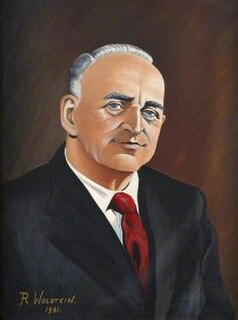Related Research Articles
The Miners' Federation of Great Britain (MFGB) was established after a meeting of local mining trade unions in Newport, Wales in 1888. The federation was formed to represent and co-ordinate the affairs of local and regional miners' unions in England, Scotland and Wales whose associations remained largely autonomous. At its peak, the federation represented nearly one million workers. It was reorganised into the National Union of Mineworkers in 1945.
The National Amalgamated Union of Enginemen, Firemen, Mechanics, Motormen and Electrical Workers was a trade union in the United Kingdom. It represented stationary engine drivers and cranemen in a wide variety of industries, as well as less skilled workers in the electrical industry and miscellaneous workers.

The South Wales Miners' Federation (SWMF), nicknamed "The Fed", was a trade union for coal miners in South Wales. It survives as the South Wales Area of the National Union of Mineworkers.
The National Union of General Workers (NUGW) was an early general union in the United Kingdom, the most important general union of its era.

The Durham Miners' Association (DMA) is a trade union in the United Kingdom.

Abraham Moffat was a Scottish trade unionist and communist activist. He was elected repeatedly to high office in the trade unions and represented the union on government coal boards. He held major union offices: President of the National Union of Scottish Mine Workers; member of the Executive Committee of the Miners' Federation of Great Britain; Vice-Chairman Scottish Regional Coal Board; and member National Coal Board. He served as president of the union from 1942 to his retirement in 1961, when he was succeeded by his younger brother Alex Moffat, also an activist.
John Brown was a British trade unionist and politician.
James Rowan was a British trade union leader.
Arthur Shaw was a British trade union leader.
Henry Boothman was a British trade union leader.

Matthew Arrandale was a British trade unionist and politician.
Tom Eccles was a British trade unionist.
William Forshaw was a British trade unionist and politician who served on the General Council of the Trades Union Congress.
Bernard Swindell was a British trade unionist, who served as chairman of the National Union of General and Municipal Workers (NUGMW).
Robert Shirkie was a British trade unionist.
The National Federation of Colliery Enginemen and Boiler Firemen was a union federation in the United Kingdom. Its membership changed over time, but was centred on unions representing enginemen at coal mines.
Thomas Watson was a British trade unionist.
The National Federation of Colliery Officials was a trade union representing colliery workers in the United Kingdom who were not involved in manual labour.
References
- ↑ "Mr Thomas Watson". Manchester Guardian. 9 June 1921.
- ↑ "Obituary: Mr William Forshaw". Annual Report of the Trades Union Congress: 245. 1938.
- ↑ "Obituaries". Report of the Annual Conference: 110. 1938.
- ↑ Marsh, Arthur; Ryan, Victoria (1984). Historical Directory of Trade Unions. 2. Aldershot: Gower Publishing. p. 199. ISBN 0566021617.
- ↑ Howell, Davies (1989). The Politics of the NUM: A Lancashire View. Manchester: Manchester University Press. p. 36. ISBN 0719030234.